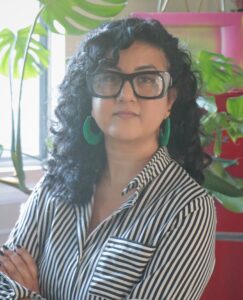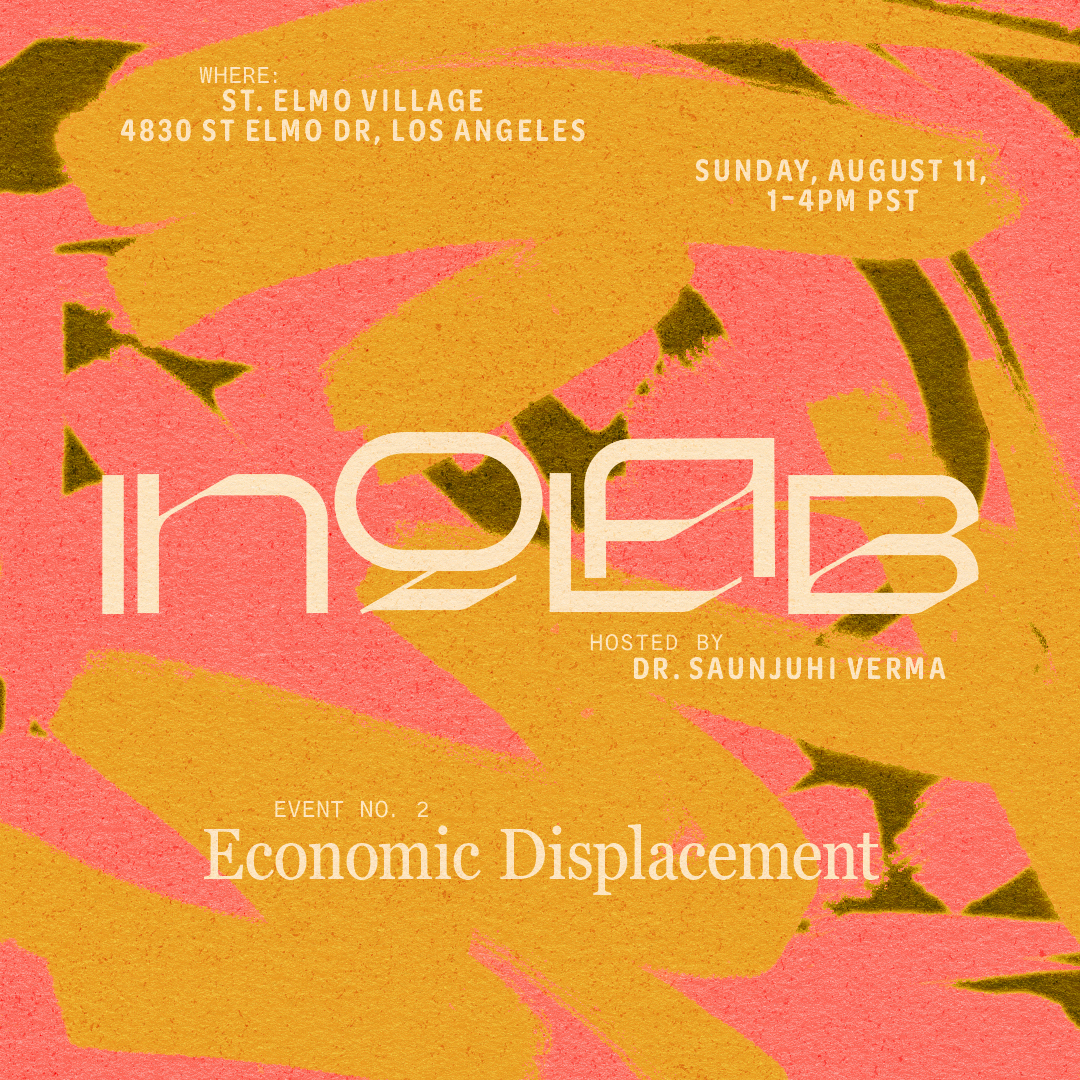Sunday, August 11, 1–4PM
On Zoom and at St. Elmo Village*:
4830 St Elmo Dr., LA, CA, 90019
*street parking is limited, we suggest carpooling and transit
Cost: $10-20; no one turned away for lack of funds (email us at [email protected] if cost is prohibitive) — offerings contribute to our community fund which supports future gatherings and collaborations with critical partners
Inqlab, which means ‘revolution’ in Urdu, is a place where we’ll build community by engaging in political education, experiential anti-colonial activities, and experiment with revolutionary tools for change. Each monthly session will expose central organizing principles of settler colonial nation-building across critical geopolitical territories — inviting us to unravel the knots of our collective oppression, foster new modes for connection, and strategize the means for constructing a world beyond the current occupation.
The August gathering focuses upon economic displacement as one of the three central tenets in the making of settler colonial nations. We will explore the role of colonial capitalism in the emergence of settler colonies. This will involve a deep-dive into the history of labor systems, such as enslavement, indenture, and immigration policies that preserve the power majority of occupiers to this day. The structure of economic displacement not only influences our access to resources but also informs our social fabric, from neighborhoods, to family structures, to our own personhood. As a collective, we will unlearn, explore, and experiment with how the political and personal exist within a white settler structure of economic displacement.
Our Inqlab community lab is a space to understand systems of oppression while building upon modes of liberation; a creative undoing of sorts. Our political unlearning will incorporate experiential modes of embodiment that range from the whimsical to the astute. We will explore with play, through my ‘Colonial Capitalism Red Flags’ game, an interactive ‘Digital Land Back’ map, and engage in sowing seeds of change through activities like ‘Green Flags of Interdependence.’
Lastly, the Inqlab community lab will be followed by an informal gathering to further connections, share laughs, and relax in the beautiful community space of St. Elmo’s Village. Join us for the mini after party, stay for the food, music, and the joys of community.
You can attend this program in-person in LA or on Zoom from anywhere, register to receive a recording and a link for the livestream.
Resources for Sunday, August 11
- Chapter 2: Dispossessing the Native from Settler Colonialism: An Introduction by Sai Englert
- Upstream Podcast Documentary Series – Myth of Freedom Under Capitalism
- Overview video from Inqlab July
- Find previous readings here
Past/Future Inqlab Gatherings
July — Inqlab: Uprooting Settler Colonialism, Re-Rooting Ourselves
September — Inqlab #3: Social Exclusion
October — Inqlab: Political Dispossession – U.S. Imperialism
About The Facilitator
 Dr. SaunJuhi Verma is a Fulbright immigration scholar, former professor, published author, and a researcher-activist with fifteen years of experience working on race and immigrant rights issues within a transnational context. Dr. Verma pivoted out of academia to found and serve as Executive Director of Inqlab, a community think tank for critical research on modes of collective liberation. Much of her passion and energy are invested in excavating the surveillance/policing infrastructure and its impact upon migrant labor, displaced communities of color, and the establishment of a settler colonial nation state. Her time is shared between scholarly productions and building community efforts for empowerment through creative expression.
Dr. SaunJuhi Verma is a Fulbright immigration scholar, former professor, published author, and a researcher-activist with fifteen years of experience working on race and immigrant rights issues within a transnational context. Dr. Verma pivoted out of academia to found and serve as Executive Director of Inqlab, a community think tank for critical research on modes of collective liberation. Much of her passion and energy are invested in excavating the surveillance/policing infrastructure and its impact upon migrant labor, displaced communities of color, and the establishment of a settler colonial nation state. Her time is shared between scholarly productions and building community efforts for empowerment through creative expression.

Welcome to the Inqlab chat room where we Uproot Settler Colonialism and Re-root Ourselves. In the moments between our monthly community labs we will continue the momentum within the chat forum. Every two weeks a prompt will be shared to enhance our understanding of settler colonial rule. Primarily, the space is for building a community of kindred spirits who are curious and committed to dismantling our systems of oppression.
As we’ve learned in our Inqlab community labs, the ongoing settler colonial occupations demand and enforce a denial of indigenous territory. Erasure is necessary for justifying and perpetuating an unjust system of rule. Such practices of extermination involve a myriad of violence including forms of cultural genocide. As such, settler rights to land are bolstered through systems of re-naming indigenous homelands. Those of us in occupied territories are made unaware of the very land on which we reside. Let’s begin to unpack our state sponsored amnesia by learning the names of indigenous territories.
Lucky for us, a collective of insightful and formidable indigenous non-profit staffers have built a digital map outlining indigenous territories! Native Land Digital is a Canadian non-profit committed to fostering “conversations about the history of colonialism, Indigenous ways of knowing, and settler-Indigenous relations, through educational resources such as our map and Territory Acknowledgement Guide.” (https://native-land.ca/about/why-it-matters/) Let us follow their lead and discover the lands we inhabit from a decolonial lens. May this be a critical step in our collective journey towards land back and full liberation.
Use the Native Land Digital Map to identify the indigenous nations and history of your location. Share how the new or existing knowledge shaped your relationship to the land and sense of home.
https://native-land.ca/
For myself, since moving out of the South Asian subcontinent on to Turtle Island, I’ve inhabited multiple indigenous territories. Some of the nations on whose land I was an unknowing accomplice of occupation, include, the Nooksack nation (renamed by Captain Vancouver in Canadian colonial rule); the Kickapoo nation, and Tongva/Kizh nations (renamed as Indiana and California by the U.S. occupation, respectively).
As a non-native of these territories, it feels jarring to be so untethered to the history and original inhabitants of the land. For our family, being granted entry into the settler colonies of Canada and United States involved endless hurdles within the systems of immigration. The process had and continues to shore up the inequities between the global north (i.e., ruling powers) and my homeland in the global south. Yet, I cannot help but be keenly aware that my right to entry and residence is conditional on an implicit participation in the ongoing occupations. Our family’s journey towards greater material opportunities was tethered to perpetuating the system of indigenous dispossession. The Janus face reality makes me curious about modes of indigenous and BIPOC solidarity as a path forward in the struggle for land back. What curiosities and insights does it raise for you?